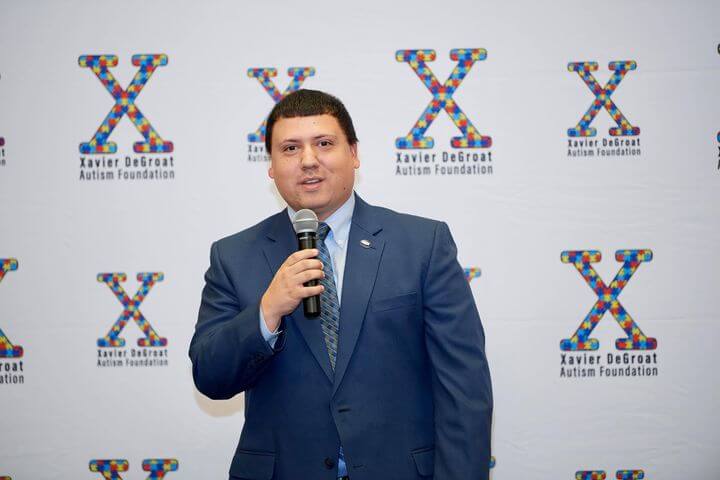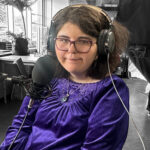February 25, 2026
Xavier DeGroat Shares His White House Experience and Life with Autism

FEATURED POSTS
January 27, 2026
December 30, 2025
Last fall, when Xavier DeGroat received an opportunity to work at the White House as an intern in the Office of Presidential Correspondence, he packed his bags at his home in Lansing, Michigan, and relocated for three months to the thriving metropolis and national capitol of Washington, D.C. Only Washington, D.C., wasn’t the usual hub-bub of activity. Under lockdown due to COVID-19, an eerie quiet fell over the city—a quiet, intermixed with the frenetic anxiety of the 59th presidential election and the departure of then-President Trump.
Still, Xavier welcomed the chance to serve his country and work in the White House. Recently, LEARN talked to Xavier about his experience in Washington, his work for the autism community, and his thoughts, as an adult with autism, about some of the community’s most pressing issues.
Q: Tell us, Xavier, about your experience as a White House intern.
A: From September to December in 2020, I lived in D.C. It was a wonderful experience that gave me a lot of networking opportunities, which is great for my advocacy work with my foundation, the Xavier DeGroat Autism Foundation. Of course, it was a turbulent time, with the presidential election and COVID. Security was a major issue, but I had a job to do. In the Presidential Correspondence Office, I checked the mail and the endless letters coming to the president—there were letters about issues relating to stimulus checks, letters of sympathy for the death of Robert Trump, the president’s brother, and a mix of critical and supportive letters for the president, too.
I had met President Trump the previous year, in the Oval Office, when I had a chance to speak with him about matters related to the Department of Homeland Security and the police force. You see, sensory overload anxiety can be triggered easily in people with autism at airport checkpoints, which are full of crowds, noises, and bright, flashing lights. So, I was there to talk about the TSA regulations that need changing, in addition to regulations about restraining people with autism and disabilities. The meeting was supposed to be only five minutes long, but I was there for a full half hour. “Do you mind if I call you X man?” President Trump asked me. He was really friendly and personable.
 Q: That sounds like an amazing experience. Now that you’re back in Michigan, what are you working on now with your foundation?
Q: That sounds like an amazing experience. Now that you’re back in Michigan, what are you working on now with your foundation?
Right now, I’m devoting time to fundraising. I’ve realized over the years that without money, we can’t do much. I also have some events coming up next spring in Ann Arbor, Michigan. I’m a big sports fan and love the idea of sensory rooms at stadiums. Jim Harbaugh, head coach of the University of Michigan’s football team, will be part of the initiative, along with his brother John Harbaugh, head coach of the Baltimore Ravens.
Soon, I’m going to the Oval Office to speak with Joe Biden and Kamala Harris about health insurance, and how hard it is for people with autism who can’t work to afford insurance.
I’m also publishing a book about my experiences.
Q: What, specifically, is your book about?
A: It’s a memoir about my life. I have a long story full of challenges that I eventually overcame—I hope I can inspire other people. I was diagnosed with autism at age 4, though originally told I had ADHD and given Ritalin. Later, they realized I had some sensitivities and anxiety and told my parents I have Asperger’s syndrome. I also had epilepsy, which was more concerning than autism for my family because of the health risk.
In school as a kid, I was labeled with “the R word” and had a hard time understanding or using sarcasm, nuance, and what I call “gray language skills.” I took things literally, like many people with autism. This would lead me to use the wrong word, miscommunicate, or struggle to conceptualize conversations. Ultimately, it led me to get bullied at school.
I spent a lot of time during my childhood at home and alone. I didn’t get the resources I needed, and school was overstimulating. I wanted an in-between, where I could have family around to support me and activities to keep my mind and body in shape. Things like LEGOS and puzzles calmed me.
High school was the most challenging time. I dropped out of school in 11th grade for about three months when the bullying became especially bad. Kids were immature or disrespectful. I couldn’t cope, and even some of my teachers didn’t understand me. They tried to give me accommodations, like extra time on assignments, but my problem was really with the whole environment. My dad helped me find a summer school program, which allowed me to catch up and still earn my diploma the next year.
Around that time, when I turned 17, the doctors did some tests and realized I didn’t have epilepsy anymore. This was truly enriching. I was able to get my driver’s license and start driving a few years later, after everyone knew it was safe. I could go anywhere I wanted, on my own timeframe. That was a real turning point.
Now, I’m doing some groundbreaking things and devoting my life to helping people with autism.
Q: That’s an inspirational story that many people, autistic or not, would love to read. What are some things you wish people understood about living with autism?
A: Children with autism need to be themselves. They need time to touch things or even rip things and make a mess. They’re not staring off into space or exploring aimlessly or because they’re just wanderers—they’re doing it because they’re curious and trying to make sense of the world and figure things out. They need space to think and ask questions, and some schools just aren’t the right environment for that because they focus too much on being on time and doing everything within a certain time period.
I think neurotypical people can learn a lot from neurodiverse people if they take the time. In fact, I don’t like to think of autism as a disability because it’s really about neurodiversity. If you look at an autistic’s neurodiversity, you might see that certain skills can be even more accelerated than a person without autism.
I would also advise people not to get anxious when an autistic is quiet. Some are introverts. They keep to themselves, and that’s OK.
 Q: After listening to some of the conversations about Autism Awareness versus Autism Acceptance Month, our organization, LEARN, decided to embrace acceptance, without losing sight of awareness. Do you have any thoughts on that conversation?
Q: After listening to some of the conversations about Autism Awareness versus Autism Acceptance Month, our organization, LEARN, decided to embrace acceptance, without losing sight of awareness. Do you have any thoughts on that conversation?
A: I like the change to acceptance, as long as we realize that without awareness, there can be no acceptance. It’s takes about 99 percent awareness to have one percent of acceptance. It all starts with education. We can’t force people to accept something they don’t understand. As the late Congressman John Lewis once told me, everybody is aware that I’m Black, but that doesn’t mean they accept me. So, yes, acceptance is the greater goal.
Unlike some autism activists, I don’t get too hung up on language. It’s more about how the person treats me than whether they call me “autistic” or a “person with autism.” Some people might prefer one to another, sort of like some people preferring “Black” to “African American.” It really just depends.
Q: You’ve created an impressive platform for your advocacy work. Who inspired you along the way?
A: My parents inspired me. I know I cost them a lot of money growing up, and sometimes I feel ashamed of that. But they also said to me: “We want you to be successful. We want you to be independent.” They set those goals for me, and that helped.
I don’t have a bachelor’s degree yet, but I’m looking at finishing college. I want to earn a degree, but I think I’ve had great life experiences that add up to more than a degree, probably. Nikola Tesla didn’t go to college but became who he is today through hard work and effort. He definitely inspires me.
Temple Grandin, the scientist and activist, also inspires me. She’s a friend of mine and has told me: “You have a mission to do something specific with your life, and you’re doing it. You’ve pulled yourself up and earned it.” She’s all-generational in her advocacy and believes that it’s not so much words that matter. It’s how you use them. That’s why I have a problem with some of today’s activities—they sometimes go a little too far. I consider myself more middle of the line.
As a child, I wanted to be an astronomer. Later, when I met Stephen Hawking, he encouraged me to get out there and explore, which is what scientists do. He said I didn’t have to be a paid scientist at NASA to think and act like a scientist—I could be an amateur scientist and use that mindset in my life. He said that when people with autism ask questions—How big is the sky? How big is the universe?—maybe they’re interested in learning things. They’re not being annoying. They actually want to figure things out.






